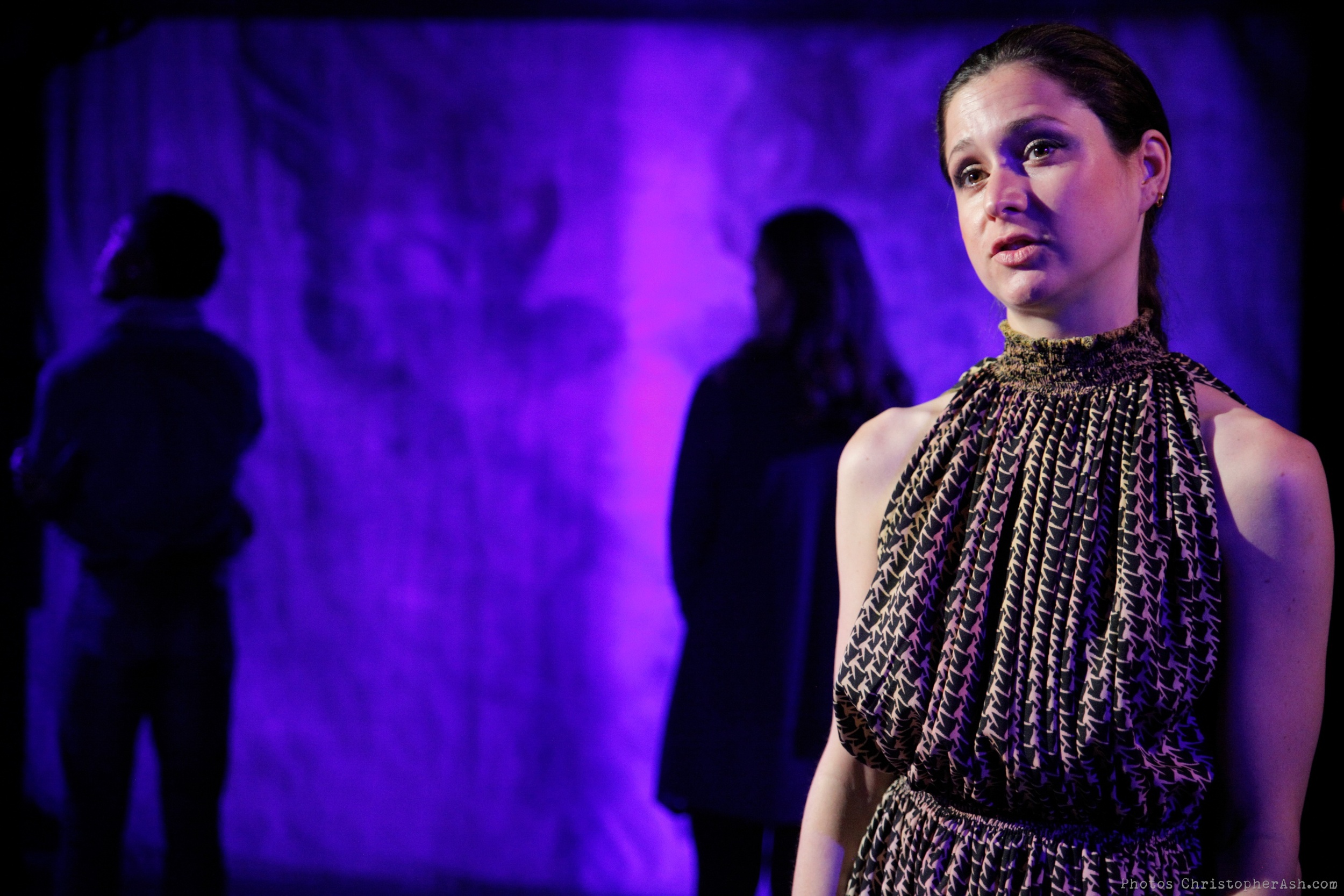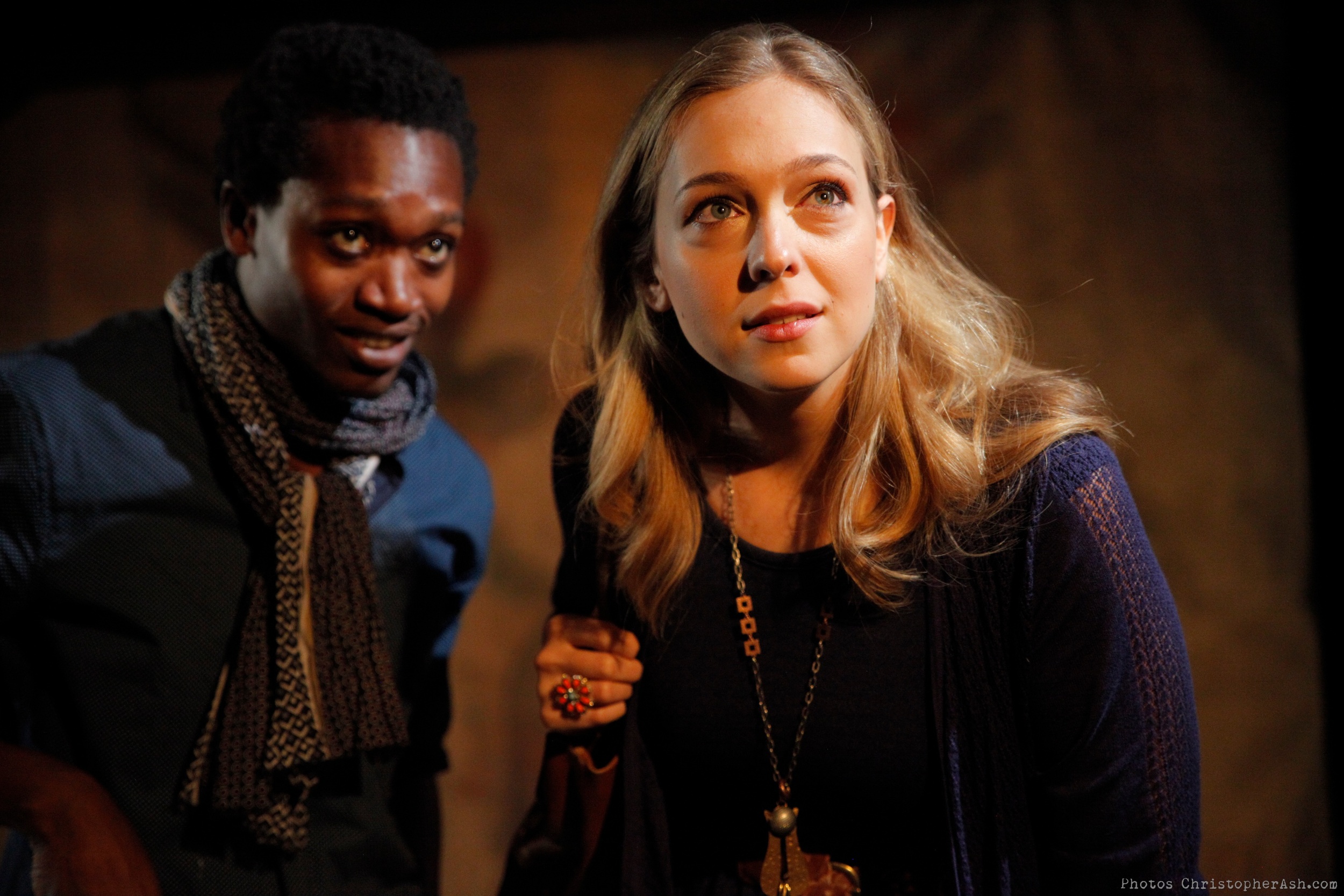Review of A Map of Virtue Erin Courtney’s A Map of Virtue, the second offering of the 40th Anniversary Yale Summer Cabaret this year, is certainly a curiosity. Structured by titled segments—virtues like “Honesty,” “Integrity,” “Love”—that form a symmetrical arrangement around a central section, the play, as directed by Co-Artistic Director Luke Harlan, keeps us guessing about its ultimate ends.
Along the way float much imagery and narrated events and lingering details, which might be red herrings or what Alfred Hitchcock liked to call “MacGuffins,” plot-driving elements that never get a full explanation because they are actually incidental to the story. Mention of Hitchcock and MacGuffins is all-too germane to Courtney’s play, which opens with two characters—Sarah (AnneLise Lawson), an artist and free-spirit, and Mark (Ato Blankson-Wood), an intrigued gay man—describing their first encounter, in a diner where a bird attack straight out of Hitchcock’s The Birds takes place. And, as MacGuffins go, one of the prime examples is the bird statue in The Maltese Falcon. Oh, did I mention that A Map of Virtue is narrated by a little bird statue that Mark stole from the office of the headmaster who abused him and other boys? The statue—enacted by Ariana Venturi—gives us the titles of the segments and also reflects on the action from time to time.
Apart from whatever the play may be saying about the values of virtues, the plot itself has more to say about haphazard events, serendipitous meetings, personal obsessions, and, well, curiosity—which some may regard as a virtue and others if not exactly a vice then—a meaningful word for this play I’d say—a nemesis. Indeed, the multiplying instances of bird imagery and the history of the little statue itself could stand for that ancient concept, as a tendency of fate.
In Courtney’s play, the bird statue comes into Mark’s possession during a traumatic time as a child and he keeps it until, a grown man, he gives it to Sarah, in part because she has birds tattooed on her chest, and in part because of the bird attack and in part because he encounters her, by sheer “chance,” on a cliff in Ireland when he’s considering disposing of the little keepsake. The statue's ultimate fate occurs during a desperate weekend in the country where Mark, Sarah, and her husband Nate are held captive by a creepy couple, June and Ray (the latter often donning a bird mask that might put you in mind of the mask of human flesh in The Texas Chainsaw Massacre, if you’re into that kind of thing). The period in the one-room prison, complete with dirty mattress and odd headmistress-like commands from June, might give you the creeps—nothing occurs to lighten the tension—but it plays out like a nightmare that will be over at some point (or a rural “urban story”), and becomes a crucible for the tensions in the play.
The upshot of all this are the changes in the relationship between Mark and his boyfriend Victor and between Sarah and Nate, with Sarah possessed by a new obsession that there were children, or a child, present at the site of their captivity, children who needed to be rescued.
Harlan and company play to the strengths of the Cabaret in putting on this oddly dreamlike morality tale. The space’s intimacy makes us accept the character’s (including the statue’s) direct address easily, bringing us into the events they narrate even when they seem rather unrealistic or off-putting. As Sarah, Lawson gives us a woman who seems believable as an artist-type, driven by hunches and intuition (the latter is a named virtue), but who also seems capable of going off the deep end at some point. Blankson-Wood’s Mark, despite his penchant for encountering creepy headmaster/mistress types, seems much warmer and engaging, though he did slash Sarah’s painting of “his” statue, one of the many acts or statements in this play that seem fit for an airing on a psychiatric couch.
As the creepy couple, Celeste Arias plays June like a somewhat psychotic schoolteacher and Aaron Bartz makes Ray oddly soulful in his interludes of song (his banjo retaining its Deliverance-inspired status as creepy rural instrument par excellence), and his “I’ve Still Got the Goods” might well be a tagline for hen-pecked husbands everywhere. As husband Nate, Aubie Merrylees seems pretty much steadily bemused by life with Sarah and will be remembered for his joyous outburst, “thank God for GPS!” Victor, Mark’s boyfriend, is played as the godsend he is by Julian Elijah Martinez. Finally, as “bird statue,” Ariana Venturi’s flowing garment, regal profile, and air of warm regard for human frailty combine to make her the centerpiece of the play, a MacGuffin who, in my reading of the play, is the figure for Courtney’s sense of agency.
Kate Marvin’s Sound Design is great at making us jump or freaking us out, and the Scenic Design (Christopher Thompson) and Lighting Design (Andrew F. Griffin) make the most of the amorphous Cab space to let us imagine diverse settings, with that room far upstage the kind of space you might find in your darker dreams at some point. Played close to the chest, thus letting viewers make up their own minds about matters of “empathy” (another cited virtue) and identification with the characters, A Map of Virtue is a bit like trying to make sense of someone else’s dream. Elusive, imaginative, and ultimately a matter of one’s trust in patterns and perceptions, this is one you’ll have to talk about.
A Map of Virtue returns tonight and plays until its closing Sunday night.
A Map of Virtue By Erin Courtney Directed by Luke Harlan
Sarah: AnneLise Lawson; Mark: Ato Blankson-Wood; Nate: Aubie Merrylees; Victor: Julian Elijah Martinez; Bird Statue: Ariana Venturi; June: Celeste Arias; Ray: Aaron Bartz
Scenic Designer: Christopher Thompson; Costume Designer: Steven M. Rotramel; Lighting Designer: Andrew F. Griffin; Sound Designer: Kate Marvin; Stage Manager: Avery Trunko; Photography: Christopher Ash
Yale Summer Cabaret June 19-June 29, 2014






